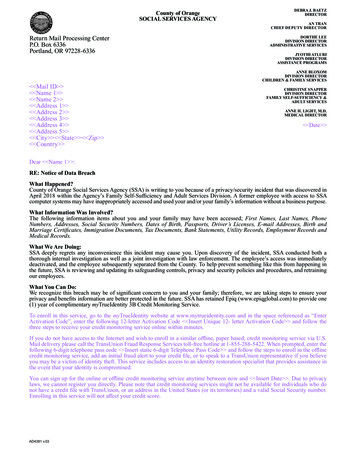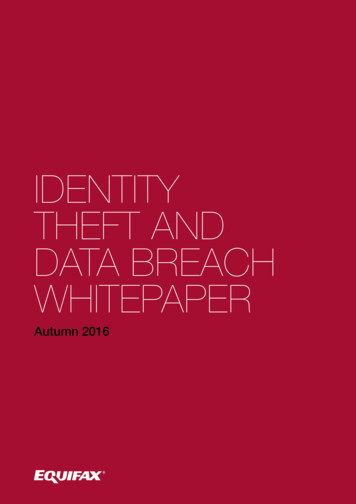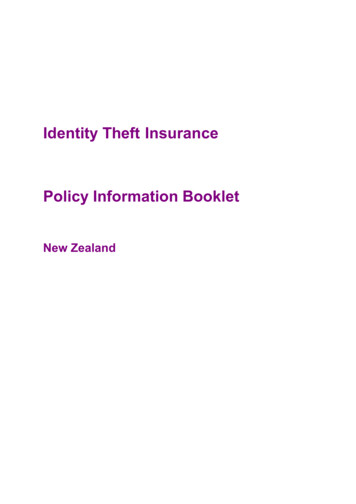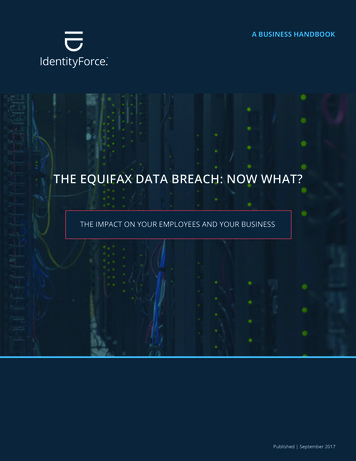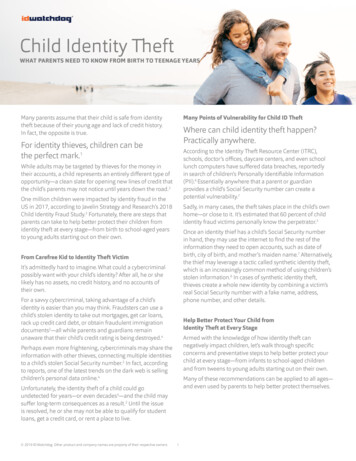
Transcription
ID Theft Protection KitCongratulations.You’ve taken a big stepin protecting the powerof your credit and your identity.Identity theft is a serious crime. Victims can spend a significantamount of time and money to clean up the mess thieves havemade of their good names and their credit. In some cases,victims have lost job opportunities or been turned down formortgages or other loans. Now you have a useful tool tominimize the impact identity theft can have on your life.Keep reading for information on the steps you can take toprotect your identity and what to do if you become a victim.
Contents1.0Identity Theft BasicsI: What is Identity Theft?II: T en Important Steps You Can Take to Prevent Yourselffrom Becoming A Victim of Identity Theft.III: W hat to Do if You Are a Victim of Identity Theft.IV: Victim’s Rights.2.0List of Resources Where to Turn in the Event That YouBecome a Victim of Identity Theft.3.0Latest Trends in Identity TheftNew Identity Theft TacticsYou Should Be Aware Of.Equifax Dedicated Customer Supportn1-800-4 EQUIFAXn24 Hours a Dayn7 Days a Week
1.0Identity Theft Basicsn I . What IsIdentity Theft?Then, they use your personalinformation by O pening new credit card accountsusing your name, date of birth, andSocial Security Number. When theyuse these credit cards and do notpay the bills, the delinquency isreported on your credit report. Establishing phone or cellularservice in your name. Opening a bank account in yourname and writing bad checks onthe account. Counterfeiting checks or debitcards and draining your bankaccount. Buying cars by taking out autoloans in your name. Calling your credit card issuer andpretending to be you, changing theaddress on the account, requestingnew cards be issued and the creditlimit increased. Bills get sent to thenew address, so you do not realizethere is a problem until you checkyour credit report. Filing for bankruptcy using yourname to avoid paying debts theyhave incurred under your name.Identity theft occurs when someonesteals your personal information — totake over your credit accounts, to opennew ones, to take out a loan, to rent anapartment, to access bank accounts,or to commit many other crimes usingyour identity. When identity theftstrikes, the effects can be devastating.What’s more, because it frequentlyinvolves no physical theft, identitytheft may not be noticed by its victimsuntil significant damage has beendone, potentially several months andthousands of dollars later.How Do Thieves Do It?First, they steal your personalinformation by G oing through your mail or trash,looking for bank and credit cardstatements, pre-approved creditoffers, and tax information. Stealing personal informationfrom your wallet or purse, such asidentification, and credit orbank cards. Completing change-of-addressforms to redirect your mail. Acquiring personal information youshare over unsecured sites onthe Internet. Buying personal information aboutyou from an inside source. Forexample, a store employee mayget your information from a creditapplication or by “skimming” yourcredit card when you makea purchase. Accessing your personnel recordsat work.Identity Theft StatisticsThe 2010 Identity Fraud Survey Reportpublished by Javelin Strategy andResearch reports that in 2009: 1 1,100,000 adults became IDfraud victims (4.8% of theU.S. population) The total annual fraud amountwas 54 billion.Sources: Javelin Strategy and Research, 2010,Identity Fraud Survey Reportn II. T en Important StepsYou Can Take toPrevent Yourselffrom Becoming AVictim of Identityand to Minimize thePotential DamageAccording to the 2010 Javelin IdentityFraud Survey Report, there is an upturnin fraudsters targeting consumers’existing credit card accounts, andopening new accounts withstolen information.Unfortunately, it is not possible toprevent identity theft and creditfraud entirely, but by managing yourpersonal information carefully, you cansubstantially reduce the likelihood thattheft will happen to you. The followingare some of the things you can do:1. Lock your Equifax credit fileEquifax Credit Report Control 1, foundin Equifax Complete Premier , andother selected products lets you decidewhether your Equifax credit file can beaccessed (certain exceptions apply*),and keeping your Equifax credit filelocked can help prevent identity thievesfrom getting credit in your name. Thisfeature gives you greater protectionand peace of mind because companieswill not be able to pull your credit reportwithout your authorization. When youare applying for loans or credit, EquifaxCredit Report Control allows you andonly you to unlock your Equifax creditfile for a period of time, or even forspecific companies. You can also makechanges to your lock status online orover the phone when you are on the go.Equifax is pleased to provide this information for your convenience, however it is provided for informational purposes only and does not constituteprofessional or legal advice of any kind or description. The information contained in these materials is believed to be reliable at the time it was writtenbut it cannot be guaranteed in so far as it is applied to any particular individual or situation.1Equifax Dedicated Customer Supportn1-800-4 EQUIFAXn24 Hours a Dayn7 Days a Week
1.0Identity Theft Basics2. Place fraud alerts on yourcredit fileThe stolen data is usually sold throughinstant-message groups or onlineEquifax includes a free Automatic Fraud forums that last only hours or days, toavoid being tracked by authorities.Alert* feature with Equifax CompletePremier and selected other products.Now you can take action to helpThis feature allows you to place aninitial 90-day fraud alert on your Equifax protect yourself against this new kindcredit file which will then be referred to of identity theft. Equifax CompletePremier includes WebDetect. Thisthe other nationwide credit reportingproduct scans suspected Internetagencies. A fraud alert on your credittrading sites and chat rooms for yourfile is a good way to help preventSocial Security Number (if elected) andidentity theft, as it notifies lenders thatup to 10 major credit and debit cardthey should take steps to verify yournumbers you provide, alerting you ifidentity, such as by contacting youyour sensitive personal information isbefore authorizing new orfound on suspected trading sites. Justadditional credit.visit Equifax.com to learn more.* The Automatic Fraud Alert feature is madeavailable to consumers by Equifax InformationServices LLC and is fulfilled on its behalf byEquifax Consumer Services LLC.3. Scan the Internet for your personalinformation with WebDetect 2You probably already know youridentity is one of your most valuableassets, but are you aware that thievesare buying complete identities —including names, Social SecurityNumbers, functioning credit cardnumbers and more — for as little as afew dollars? The trend in thieves gettinginformation on suspected undergroundInternet trading sites continues to rise.**This escalation has allowed criminalsto buy personal information in bulk,putting more and more people at risk ofidentity theft.According to the FBI and the NationalWhite Collar Crime Center, Americansin 2009 reported losses of 559 millionas a result of online fraud, with averagelosses running around 575.‡ Asidentity thieves become savvier, somehave recruited hackers to defraudconsumers of personal information.**Robertson, Jordan. “Online Crooks Face ToughCompetition.” Washington Post. 8 April 2008.‡ Internet Crime Complaint Center. “2009 InternetCrime Report.”4. Monitor your creditChecking your credit report can helpyou identify potentially fraudulentactivity before it wreaks havoc on yourpersonal finances. Make sure yourreport is accurate and includes onlythose activities you can explain.It is also a good idea to review yourcredit report from each of the threemajor credit reporting agencies everyyear, as it is possible that information isreported to one but not the others.Think about monitoring your credit likehaving a smoke detector in your home.It is not something you turn on oncein a while; you keep it on, knowing itwill alert you when there are problems.Key changes to your credit file will helpyou quickly identify potential problems.This is especially important given theamount of and speed at which personalinformation is exchanged today.Enrolling in a credit monitoring productlike Equifax Complete Advantage orEquifax Complete Premier takes theworry out of protecting your credit file,by notifying you within 24 hours ofkey changes that could be the earlywarning signs of identity theft.*5. Be careful when giving out yourpersonal informationWhether on the phone, by mail, or onthe Internet, never give anyone yourcredit card number, Social SecurityNumber, or other personal informationfor a purpose you do not understand.Ask to use other types of identifierswhen possible, and do not carry yourSocial Security card. Be sure to keep itin a secure place.6. Protect your documents and mailTo stop a thief from going throughyour trash or recycling bin to get yourpersonal information, shred your chargereceipts, credit applications, insuranceforms, bank statements, expiredcharge cards, and pre-approved creditoffers. You can help reduce yourrisk by choosing to opt-out of preapproved offers of credit or insuranceproducts by calling 1-888-567-8688.Deposit outgoing mail in post officecollection boxes or at your local postoffice. Promptly remove mail from yourmailbox after it is delivered. If you planto be away from home, call the U.S.Postal Service at 1-800-275-8777 orgo to www.usps.com and request avacation hold on your mail delivery.Equifax is pleased to provide this information for your convenience, however it is provided for informational purposes only and does not constituteprofessional or legal advice of any kind or description. The information contained in these materials is believed to be reliable at the time it was writtenbut it cannot be guaranteed in so far as it is applied to any particular individual or situation.2Equifax Dedicated Customer Supportn1-800-4 EQUIFAXn24 Hours a Dayn7 Days a Week
1.0Identity Theft Basics7. Guard your credit cards andPINs/passwordsMinimize the information andthe number of cards you carry inyour wallet. Do not keep personalidentification numbers (PINs) or othercredit card access codes with yourcredit card. If you lose a card, contactthe fraud division of the credit cardcompany immediately. If you applyfor a new credit card and it does notarrive in a reasonable period, contactthe issuer. Watch cashiers when yougive them your card for a purchase.Also, when you receive a new card,sign it in permanent ink and activate itimmediately. Memorize your passwordsand PINs instead of carrying themwith you. Avoid using easily availableinformation passwords, like yourmother’s maiden name, your birthdate, the last four digits of your SocialSecurity Number or phone number, or aseries of consecutive numbers.8. Pay attention to billing cyclesContact lenders immediately if yourbills arrive late. A missing bill couldmean an identity thief has taken overyour credit card account and changedyour billing address.9. Safeguard personal information inyour homeMake sure that sensitive personalinformation, such as bank statements,Social Security paperwork, passports,etc., is stored in a safe place inyour home. If you have a serviceappointment requiring outside helpto enter your residence, pay specialattention to ensure your personalinformation is secure. If you are unableto be at home for the duration of theappointment, consider asking a friendor family member to help.10. Protect your computeragencies and check for any newViruses and other malware are rampant accounts opened in your name.on the Internet, so keep your anti-virus Because new accounts may takesoftware up-to-date. Use caution when up to six months to show up on thereport, continue to monitor your creditdownloading information, and be surereports. A Three-Bureau Credit Reportyou know that the source is credible.When downloading e-mail attachments, from Equifax will give you a line by lineperform a virus scan first — even if you comparison of your credit history asreported to Equifax, Experian,know the person who sent it to you -and TransUnion.as his or her own e-mail account mayhave been compromised.Contact any of the creditreporting agenciesn I II. What to Do If YouAre a Victim ofIdentity TheftIf you suspect that someone has usedyour name, Social Security Number, orother personal information to get creditor a loan, the following information canhelp you:Keep a recordRecovering from identity theft can bea long and complicated process, soit is important to keep a record of allcommunications. Send all letters bycertified mail and keep copies. If youthink your case might lead to a lawsuit,keep track of how much time youspend dealing with the problem.Contact any one of the threenationwide credit reporting agenciesand request that an initial 90 day fraudalert be placed on your credit file.Once your alert is placed on your creditfile at one of the nationwide creditreporting agencies, it will automaticallybe forwarded to the other two so thatyou do not need to contact each ofthem separately.Subscribe to a creditmonitoring productProducts like Equifax CompleteAdvantage or Equifax CompletePremier monitor activity in your creditfile. When there are changes to keyinformation, like when new creditaccounts are applied for in your name,you receive an alert. You can thenview the alert, which will describe theCall the policechange to your credit file, so that youReport the crime to the policecan make sure it is not the result ofor sheriff’s department that hasidentity theft or fraud. You can alsojurisdiction in your case and request ahelp prevent identity theft from takingpolice report. Though the authoritiesplace by using the Automatic Fraudmay be limited in what they can do toAlert feature (included with Equifaxhelp, a report may be necessary to helpComplete Premier), which enables youconvince lenders that someone elseto place a fraud alert on your Equifaxhas opened an account in your name.credit file (and referred to the othernationwide credit reporting agencies)Check your credit reportand is automatically renewed everyGet your credit report from each of90 days. This prompts lenders to takethe three nationwide credit reportingsteps to verify your identity, such as byEquifax Dedicated Customer Supportn1-800-4 EQUIFAXn24 Hours a Dayn7 Days a Week
1.0Identity Theft Basicscontacting you before authorizing newor additional credit.Visit www.equifax.com to learn moreabout Equifax identity and creditmonitoring products.n IV. Victims’ RightsIf you have been a victim of identitytheft, you have certain rights. Here is abrief summary of the rights designed tohelp you recover from identity theft:Fraud alertsYou have the right to ask that themajor credit reporting agencies place a“fraud alert” in your file to let potentialcreditors and others know that youmay be a victim of identity theft. Thereare two types of fraud alerts: an initialfraud alert that lasts for 90 days andan extended fraud alert that lastsfor 7 years. You can place an initialfraud alert on your Equifax credit file24 hours a day, 7 days a week onlineby going to www.alerts.equifax.comor by calling our auto fraud line at1-888-766-0008 and following theprompts. Once placed with Equifax,the other two major credit reportingagencies, Experian and TransUnion,will be notified as well. You may placean extended 7-year alert by writingto Equifax or to one of the othernationwide credit reporting companiesand providing an Identity Theft Report,as well as a day and evening telephonenumber. The requirements for anIdentity Theft Report are listed on theFTC’s web site at www.ftc.gov. Theextended alert removes your namefrom pre-screened offers of credit for5 years. If you currently subscribe toEquifax Complete Premier, you mayuse the free Automatic Fraud Alertfeature within your product whichplaces a fraud alert on your Equifaxcredit file (and referred to the othernationwide credit reporting agencies)and automatically renews every90 days.Equifax Fraud AlertPhone Number: 1-888-766-0008Or go online: www.alerts.equifax.comCredit reportWhen you place a fraud alert on yourcredit file, you have the right to freecopies of the information in your file(your “file disclosure”). An initial fraudalert entitles you to a copy of all theinformation in your file at each of thethree nationwide agencies, and anextended alert entitles you to two freefile disclosures in a 12-month periodfollowing the placing of the alert. Youcan obtain your free fraud alert creditfile disclosure from Equifax atwww.alerts.equifax.comYou also have a right to obtain afree copy of your credit report onceevery 12 months from each of themajor nationwide consumer reportingcompanies. To order your free annualreport from one or all the nationalconsumer reporting companies, visitwww.annualcreditreport.com, call tollfree 1-877-322-8228, or complete theAnnual Credit Report Request Formand mail it to: Annual Credit ReportRequest Service, P.O. Box 105281,Atlanta, GA 30348-5281.Fraudulent informationYou have the right to obtain certaindocumentation relating to fraudulenttransactions or to accounts openedusing your personal information.A creditor or other business mustgive you copies of applications andother business records relating toEquifax Dedicated Customer Supportn1-800-4 EQUIFAXntransactions and accounts that resultedfrom the theft of your identity, if youask for them in writing and include theinformation required to respond to yourrequest. You will be required to provideproof of your identity and proof of yourclaim of identity theft (including both apolice report and an affidavit) before abusiness can give you this information.Reporting information to consumerreporting agenciesYou also may prevent businessesfrom reporting information about youto consumer reporting agencies ifyou believe the information is a resultof identity theft. To do so, you mustsend your request to the addressspecified by the business that reportsthe information to the consumerreporting agency. The business willexpect you to identify what informationyou do not want reported, to providean identity theft report, and to write aletter explaining that the informationthat they are reporting resulted fromidentity theft. Note that the informationprovider may continue to report theinformation if later it is learned that theinformation does not result fromidentity theft.Blocking consumer reportingagencies from reportinginformation in your credit fileIf you believe information in your fileresults from identity theft, you have theright to ask that a consumer reportingagency block that information fromyour file. An identity thief may run upbills in your name and not pay them.Information about the unpaid billsmay appear on your credit report.Should you decide to ask a consumerreporting agency to block the reportingof this information, you must identifythe information to block and provide24 Hours a Dayn7 Days a Week
2.0List of Resourcesthe consumer reporting agency withproof of your identity and a copyof your identity theft report. Oncethe consumer reporting agency hasaccepted your identity theft report, itmust notify the information providerabout the block. If a consumerreporting agency tells an informationprovider that it has blocked fraudulentinformation in your credit report,the information provider may notcontinue to report that informationto the consumer reporting agency.The information provider also maynot collect the debt that relates to thefraudulent account, or sell that debt toanyone else who would try to collect it.Other ResourcesFederal Trade Commission (FTC)The FTC offers information for victims.File your case with the FTCConsumerResponse Center. Include your policereport number.Use the FTC uniform affidavit form.1-877-438-4338www.ftc.gov/idtheftSocial Security Administration’sFraud Hotline800-269-0271n Helpful ResourcesIf you want to know more about identitytheft and credit fraud, the followingnonprofit Web sites are excellentsources of information and additionalcontact information.There are a number of additionalservices available if you believe youhave been a victim of identity theft:US Government Web sitefor Identity Thefthttp://www.ftc.gov/idtheftCredit Reporting BureausFTC Consumer Complaint P.O. Box 105069, Atlanta, GA 30348Report fraud: Call 1-800-525-6285 orwrite to address above.Order credit report: 1-800-685-1111www.equifax.comExperian (formerly TRW)P.O. Box 9532, Allen, TX 75013Report fraud: Call 1-888-397-3742or write to address above.Order credit report: 1-888-397-3742www.experian.comTransUnionP.O. Box 6790, Fullerton, CA 92834Report fraud: 1-800-680-7289 andwrite to address above.Order credit report: 1-800-888-4213www.transunion.comUS Department of es/idtheft.htmlSocial Security Administration/Office ofthe Inspector GeneralFraud Web sitehttp://www.ssa.gov/oig/guidelin.htmUS Secret Service: What to do if you’rea victim of identity thefthttp://www.secretservice.gov/criminal.shtmlID thieves are always on the lookoutfor new ways to obtain your sensitivepersonal information. It is critical thatyou stay one step ahead, and one ofthe easiest and most effective waysEquifax Dedicated Customer Supportn1-800-4 EQUIFAXnis to remain educated and up-to-dateregarding identity thieves’latest techniques.By knowing what to look for, you canmake better choices to protect youridentity. Whether it is a scam involvingsocial media sites, obtaining data whileperforming civic duties, or other typesof malicious attack, identity thieveswill try and take advantage of any waythey can secure your sensitive personalinformation. Here’s a selection of recentscams and techniques to know whatyou should be on the lookout for:Gadget Grifters:One of the growing types of identitytheft involves stealing informationthrough our electronic gadgets. Associety becomes increasingly “wired,”it is becoming easier to gain access tosensitive personal information on thego. Criminals can use mobile devicesto their advantage in a number of ways.If you are not careful when using yourcredit card, a thief could easily anddiscreetly take a picture of your cardwith his/her camera phone. Similarly,it is important to watch out for peeringeyes if using your computer in public.In general, take steps to safeguardyour belongings; the more personalinformation we store on our electronicdevices, the more vulnerable we leaveourselves to identity theft if thosedevices are misplaced or stolen.The best way to safeguard againstthese kinds of crimes is to be discreetwhen paying with a credit card toprevent any unwanted eyes fromseeing it. Additionally, make sure youuse secure sites on your wirelessdevices and clear all personal data fromthem when you are finished with yourtransactions. You could also considerutilizing password protection on yourphone and laptop.24 Hours a Dayn7 Days a Week
3.0Latest Trends in Identity TheftTech TacticsIdentity thieves are always developingnew ways to obtain sensitive personalinformation over the Internet. While youmay have heard of phishing (fraudulente-mails disguised as if they were fromtrusted sources to obtain personalinformation) and pharming (redirectingWeb traffic to fraudulent sites to obtaininformation), you should also beconscious of IP spoofing.They can also obtain sensitivepersonal information by posing as debtconsolidation experts or by offeringto obtain lower interest rates for thevictims. Make sure that all creditinteractions you have are withreputable sources.The Jury Duty ScamIdentity thieves often prey on people’sfear and , in some cases, their civicobligations. The “Jury Duty” scam, forexample, is remarkably easy to fall for.Imagine this scenario: you receive a callfrom a jury coordinator informing youYou can always turn to the Betterthat a warrant has been issued for yourBusiness Bureau if you are unsure.arrest due to your failure to appear forjury duty. When you explain that youStaying Safe Sociallynever even received a summons forjury duty, the coordinator asks for yourWith the rapidly growing popularityIP spoofing, or Internet ProtocolSocial Security Number and date ofof social media sites, more peoplespoofing, is a technique used to gainbirth in order to verify your informationare sharing an increasing amount ofunauthorized access to computers byand cancel the warrant. Of course youpersonal information over the Internet.tricking the computer itself into thinking Even if you do not consider some of the are willing to provide this information;the hacker’s IP is a “safe” one. Oncethere has obviously been a mistake andinformation you display on social sitesthis is accomplished, the hacker couldyou want to avoid arrest at all costs.“sensitive personal information,” youhave full access to your computer —The problem is, this is all part ofshould still use strict privacy settings.without you even knowing. The bestthe scam. There never was a warrant,way to avoid this sort of fraud is byand you have just had your identityNumerous studies have shown thatmaking sure your computer’s securitystolen.with the right technology, determinedprograms are up-to-date and byidentity thieves may be able toutilizing the most secure filter, router, or eventually piece together seeminglyThis scam has been reported in afirewall offered.insignificant facts about you along with number of states. So if you receivea phone call that seems suspiciouspublicly available information to stealNew Twists on Old Techniquesor threatening, do not panic. Simplyyour identity. The best way to preventask for more information, the caller’sIdentity thieves have relied on creditthis is to share as little informationcard scams for quite a while, butpublically as possible and ask that your supervisor, or a number at which youcurrent economic challenges havefriends be subtle in the information they can reach them after doing moreresearch. Nothing foils an identity thiefallowed them to use new, moreshare about you; your best efforts tosuccessful angles to get the information safeguard your identity can be negated like an educated response.they need. Due to tightened credit,by a careless friend’s wall posts.criminals are advertising fraudulentcredit offers to victims who may bestrapped for cash but are not qualifiedto apply for credit (poor credit score,lacking a SSN).Equifax Credit Report Control is only available while you have a current subscription to an ID Patrol, Equifax Complete Advantage or Equifax CompletePremier product. Locking your credit file with Equifax Credit Report Control will prevent access to your Equifax credit file by certain third parties, such ascredit grantors or other companies and agencies. Credit Report Control will not prevent access to your credit file at any other credit reporting agency, andwill not prevent access to your Equifax credit file by companies like Equifax Personal Solutions which provide you with access to your credit report or creditscore or monitor your credit file; Federal, state and local government agencies; companies reviewing your application for employment; companies that havea current account or relationship with you, and collection agencies acting on behalf of those whom you owe; for fraud detection and prevention purposes;and companies that wish to make pre-approved offers of credit or insurance to you. To opt out of such pre-approved offers, call 1-888-567-8681WebDetect can scan suspected internet trading sites for your Social Security number (if you choose to) or up to 10 major credit/debit card numbersyou provide. Because the addresses of the suspected internet trading sites searched by WebDetect are not published and frequently change, there isno guarantee that WebDetect is able to locate every possible internet site where consumers’ personal information is at risk of being traded. Your SocialSecurity number or the credit card numbers you have chosen to scan for with WebDetect may be at risk of being traded on the internet even if you do notreceive a WebDetect alert.2Equifax Dedicated Customer Supportn1-800-4 EQUIFAXn24 Hours a Dayn7 Days a Week
Equifax Dedicated Customer Support1-800-4EQUIFAX24 Hours a Day7 Days a Week
Equifax Dedicated Customer Support n 1-800-4 EQUIFAX n 24 Hours a Day n 7 Days a Week Contents 1.0 Identity Theft Basics I: What is Identity Theft? II: Ten Important Steps You Can Take to Prevent Yourself from Becoming A Victim of Identity Theft. III: What to Do if You Are a Victim of Identity Theft. IV: Victim's Rights.

